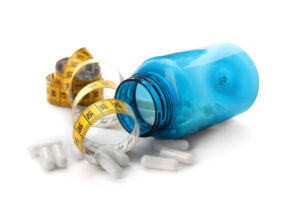Finding the right ADHD medication can be overwhelming, especially if you’re exploring stimulant medications. All stimulant-based ADHD medications work by boosting norepinephrine and dopamine levels to alleviate symptoms. However, each one is slightly different—this makes it hard to know which one will work best for your needs.
Adhansia XR and Adderall are particularly similar, especially since both medications have an extended-release version. Adhansia XR is only available as an extended-release, while Adderall comes in immediate- and extended-release formulas. In this article, we’ll outline details of each medication, including everything from side effects and contraindications to cost comparison, so you can have an informed discussion with a healthcare provider.
In 48 hours or less, Klarity can connect you with an ADHD specialist who can help determine which of these medications will work better for your symptoms and medical history. If you receive an Rx, we’ll immediately submit it to your preferred pharmacy, so you can begin treatment as soon as possible.
Want to learn more about whether Adhansia XR or Adderall is right for you? Schedule an appointment with a licensed healthcare provider on Klarity today. If diagnosed, your provider will discuss the treatment options with you and send the prescription to your local pharmacy, if applicable.
| Adhansia XR | Adderall | |
|---|---|---|
| Drug Class | Schedule II stimulant | Schedule II stimulant |
| Brand / Generic Status | Brand name for methylphenidate | Brand name for amphetamine salts |
| Form(s) of the Drug | Extended-release capsules | Immediate release tablets, Extended-release capsules |
| Standard Dosage | Extended-release capsules: • 25mg • 35mg • 45mg • 55mg • 70mg • 85mg |
Immediate-release tablets • 5mg • 7.5mg • 10mg • 12.5mg • 15mg • 20mg • 30mg |
| Conditions Treated | FDA-approved uses: • ADHD No listed off-label uses |
FDA-approved uses: • ADHD • Narcolepsy (sleep disorder) Off-label uses: • Depression • Anxiety • Bipolar disorder |
| Cost | Brand-name Adhansia: • $407 for a 30-day supply • $350 with insurance or coupons No generic form currently available for Rx |
Brand-name Adderall: • $8 per 5mg tablet • $237 for a 30-day supply Generic form (amphetamine salts): • $13 for 30 days of 5mg tablets • $85 for 30 extended-release pills |
| Side-Effects | Common side effects: • Trouble sleeping • Dry mouth • Decreased appetite • Decreased weight Serious side effects: • Circulation issues • Heart problems • Increased blood pressure • Increased mental issues • New or worsening bipolar issues |
Common side-effects: • Loss of appetite • Weight loss • Dry mouth • Nausea • Headache • Fever • Trouble sleeping Serious side effects: • Signs of blood flow problems • Behavior changes • Uncontrolled movements • Shortness of breath Irregular heartbeat • Seizures • Trouble speaking |
| Warnings For Use | Contraindicated conditions: • Pregnancy or breastfeeding Drug interactions: • MAOIs • Blood thinners • Blood pressure medication • Antidepressants • Seizure medication • Decongestants |
Contraindicated conditions: • Substance abuse Warnings: • May be habit-forming • Effectiveness may decrease over time Drug interactions: • MAOIs • SSRIs |
What is Adhansia XR?
Adhansia XR (active ingredient: methylphenidate hydrochloride) is a once-a-day, extended-release stimulant approved for use in ADHD sufferers six years of age or older. Classified as a central nervous system (CNS) stimulant, Adhansia XR affects neurotransmitters in the brain that control focus, hyperactivity, and impulsivity. Adhansia XR is a federally controlled substance similar in structure to Concerta and Ritalin.
Forms and Dosages
Adhansia XR capsules are filled with microbeads that feature two layers of protection–an immediate-release layer and a controlled-release layer. When ingested, Adhansia XR releases about 20% of the medication load. One-hour after taking Adhansia XR, the controlled-release layer begins dissolving, releasing a steady stream of medication into the bloodstream for up to 16 hours.
Adhansia XR capsules come in six strengths: 25 mg, 35 mg, 45 mg, 55 mg, 70 mg, and 85 mg. The manufacturer, Purdue Pharmaceuticals L.P., recommends adults start off with 25 mg before increasing the dosage.
Take this medication whole and do not crush or chew the capsules. You can open the capsules and sprinkle the microbeads onto a tablespoon of applesauce or yogurt. Swallow the entire mixture to avoid chewing it. Don’t drink alcohol while taking Adhansia as it can result in the medication releasing earlier than intended.
Conditions Treated
Adhansia XR is FDA approved for use in those with attention deficit hyperactivity disorder.
Costs
Adhansia XR is not yet in generic form at the time of this writing. The average retail price for a one-month supply of 35 mg capsules of Adhansia XR, without health insurance, is approximately $407. With manufacturer and third-party coupons, you may be able to lower the price to $350. For accurate pricing information under your current health insurance plan, contact your provider’s pharmacy department.
Side Effects
Common side effects of Adhansia XR include but are not limited to:
- Trouble sleeping
- Dry mouth
- Decreased appetite
- Decreased weight
Severe but less common side effects of Adhansia XR include but are not limited to:
- Circulation issues
- Heart problems
- Increased blood pressure
- Increased mental issues
- New or worsening bipolar issues
Warnings and Drug Interactions
Medication Misuse Warning
Adhansia XR is a central nervous system (CNS) stimulant medication classified as a federally controlled substance. It carries a high potential for dependency if misused. It is crucial to follow the prescribed dosage and not exceed the recommended duration of use.
Additionally, abruptly stopping Adhansia XR can result in withdrawal symptoms. Discuss any concerns or history of substance abuse with your healthcare provider to ensure safe and appropriate use of this controlled substance.
Licensed providers on Klarity provide personalized treatment. Find a provider that matches your needs and preferences.
What is Adderall?
Adderall is a mixture of four amphetamine salts: Dextroamphetamine Saccharate, Amphetamine Aspartate, Dextroamphetamine Sulfate, and Amphetamine Sulfate. This ADHD medication was approved by the FDA in 1996 for use in ADHD sufferers three years of age and older. Adderall is a federally controlled stimulant that maintains the potential for abuse and addiction.
Forms and Dosages
Adderall comes in four strengths: 5 mg, 10 mg, 20 mg, and 30 mg. It can be taken 1-2 times per day with or without food. Adderall is a stimulant that can cause sleep pattern disruption. Do not take this medication too late in the day. Adderall comes in an immediate-release and an extended-release form.
Conditions Treated
Adderall is FDA approved for use in individuals with ADHD and narcolepsy.
Costs
Adderall is in generic and brand name form. Without health insurance, you may be paying approximately $8 per day for a one-month supply. For accurate pricing under a health insurance plan, contact your provider’s pharmacy department.
Side Effects
Common side effects of Adderall include but are not limited to:
- Irregular heartbeat
- Elevated heart rate
- Increased blood pressure
- Restlessness
- Dry mouth
- Diarrhea, constipation, nausea
- Headache
- Weight loss
- Mood changes
- Anxiety
- Dizziness
Less common side effects of Adderall include but are not limited to:
- Seizures
- Eyesight instability
- Urinary tract infection
- Nausea
- Fever
- Stroke
- Heart attack
Warnings and Drug Interactions
Medication Misuse Warning
Adderall, like Adhansia, is also a Schedule II CNS stimulant and controlled substance with a high potential for dependency. Extended or excessive use of Adderall can result in physical and psychological dependence.
It is crucial to follow the prescribed dosage and not exceed the recommended duration of use. Abruptly stopping Adderall may cause withdrawal symptoms. Discuss any concerns or history of substance abuse with your healthcare provider to ensure the safe and appropriate use of this controlled substance.
Drug Interactions and Contraindications
If you experience or have experienced any of the following conditions, speak with a healthcare provider before taking Adderall:
- Heart problems like chest pain, shortness of breath
- Signs of psychosis-like hallucinations or paranoia
- Circulatory problems (numbness, pain, cold fingers & toes)
- Seizures
- Muscle twitches
- Changes in vision
Certain medications can react poorly and even dangerously with Adderall. Refer to your medication’s accompanying literature or speak with a healthcare provider who can explain the warning and drug interactions regarding Adderall therapy.
Is Adhansia XR or Adderall Better For Your ADHD?
Finding the right medication for your ADHD may include a bit of trial and error. To further your chances of finding the right medication, speak with a healthcare provider who can diagnose and treat your specific ADHD condition, if applicable.
How Klarity Helps You Discover the Right ADHD Medication
With Klarity, finding the right ADHD medication is as simple as it gets. In less than 48 hours, we’ll connect you with a licensed healthcare provider qualified to evaluate your symptoms and medical history to determine whether Adhansia XR, Adderall, or another medication is right for you.
Ready to take the first step in finding your ideal ADHD medication? Schedule your first appointment on our online portal today to meet with a licensed and certified provider in 48 hours or less.







